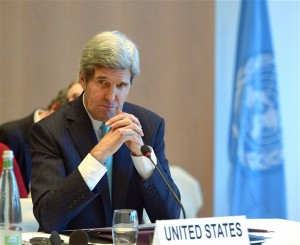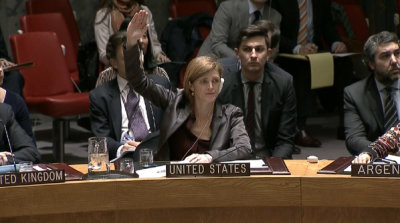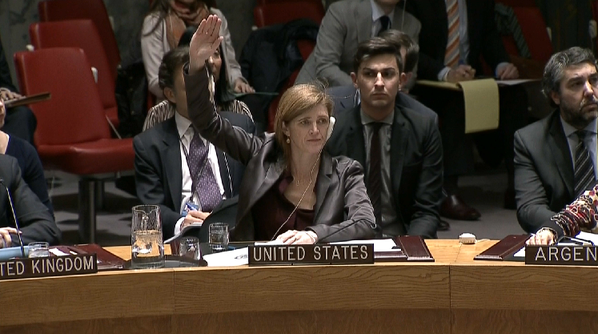
By: James Zogby
The closing weeks of the year spelt disaster for US claims to uphold the rule of law in international relations. It countered three different efforts designed to affirm Palestinian rights.
On December 17, representatives of the 126 countries that have endorsed the Fourth Geneva Convention, which governs the rules of war and military occupation, met in Geneva at the invitation of the Swiss government. By consensus, the meeting passed a 10-point declaration reaffirming that the Convention was applicable to the territories occupied by Israel in 1967. After working behind the scenes for months to persuade the Swiss to cancel the session, the US was one of a small number of countries that declined to attend the meeting.
But the Fourth Geneva Convention was written and ratified by the international community at the end of the Second World War to ensure that the abuses that occurred during that war would not be repeated. It prohibits the annexation of occupied territory; the transfer by the occupying power of its population into the territory; and individual or mass forcible transfers and deportations of the territory’s indigenous population. The Convention also prohibits altering the status of the occupied people’s public officials; destruction of public property; all forms of collective punishment; administrative detention; violence, insults and intimidation of the occupied population; and the use of physical coercion and torture. It obligates the occupying power to respect the human and legal rights of the population under its control.
December’s Geneva meeting called on Israel to “fully and effectively” respect the Fourth Geneva Convention. In the past, the US has affirmed its applicability to the occupied territories and there is indisputable evidence that Israel has repeatedly violated each of the convention’s provisions in the past 45 years. The US attempts to block the Geneva meeting and its subsequent refusal to attend, calls into question its commitment to the convention.
December 2014’s second US act of refusal to affirm Palestinian rights was kick-started the same day as the Geneva declaration. Jordan submitted an Arab League-endorsed resolution to the UN Security Council reaffirming Palestinians’ right to self-determination. The resolution called for renewed negotiations, ending with a two-state solution. It also affirmed the need for a just, lasting and peaceful solution and set a deadline of “no later than 12 months”.

As expected, the US called the resolution “deeply unbalanced” and “unconstructive”. It said the deadlines did not take account of Israel’s legitimate security concerns. The US lobbied the Arabs not to submit the resolution, then pressed other countries to oppose it or to abstain. Then, on December 30, it voted against it.
In acting as it did, the US ignored the fact that much of the language of the resolution came from positions it has previously endorsed. Far from being unbalanced, it included language condemning terrorism against civilians and acts of incitement. It also called for the implementation of security arrangements.
The US also ignored what the resolution clearly indicated – that the Palestinians were frustrated with the US-led efforts to broker peace. In the 21 years since the signing of the Oslo Accords, the US has shown itself as incapable of acting as an “honest broker”. Successive administrations have turned a blind eye to Israeli abuses of Palestinian rights and the manner in which it has frustrated any chance of peace and humiliated the moderate Palestinian leadership.
The result is that all these years after Oslo, all we see is process and no peace, even as the number of Israeli settlers in the occupied territories has tripled and the Palestinian Authority has increasingly lost authority and legitimacy. It was in a last-ditch effort to demonstrate that its non-violent political approach could bear fruit, that the Palestinian leadership advanced the resolution at the UN.
When the resolution failed to pass, the PA decided to sign the Rome Statute, paving the way to join the International Criminal Court and 19 other international agreements. In response, Israel threatened to withhold the tax transfers it is obliged to send to the PA, and to deny PA officials the right to travel. The US reaction was predictable, with the State Department calling the move “counterproductive”. Equally predictable were the calls by some members of the US Congress to suspend assistance to the Palestinians.
Several concerns emerge from the recent US actions. First, the diplomatic approach taken by the Palestinian leadership has hit a dead end. US behaviour over decades makes clear that it cannot manage the peace process fairly and will try to block any initiative to involve anyone else in the effort. The imbalance about which we should be concerned is not in the language of a UN resolution. Rather it is in Israel’s unfettered control over all aspects of Palestinian life. The virtual rape of the occupied territories and the humiliation of the Palestinian people and their leadership has produced a frightful situation in which the US stands unwilling to act. The result is a dangerous brew of Israeli impunity and Palestinian humiliation.
Also of concern is the inability of the US to affirm the very framework of international law it claims to uphold. Far from the Arabs “singling out Israel for criticism”, as Israel’s supporters are quick to charge, US actions end up singling out Israel as the one country that escapes criticism for its illegal behaviour. By making Israel the exception, the US undercuts not only its stated commitment to the rule of law, it makes a mockery of the law itself.
Dr James Zogby is the president of the Arab American Institute
The National


Leave a Reply
You must be logged in to post a comment.